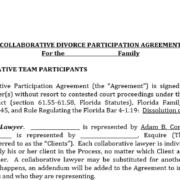It is common when going through divorce in Florida or elsewhere for one or both spouses to be lost when it comes to finances and retirement planning. One of the best things that you can do to make divorce less traumatic and to help ensure that you and your spouse’s interests are being met is to involve a Neutral Financial Professional within a Collaborative Divorce process.
It is also important to educate yourself when it comes to finances. Below are a list of books that I have personally found helpful to educate myself. Even if you are not going through divorce, you may get something from these resources.
The Total Money Makeover by Dave Ramsey
If you have medical school student loans, a high interest mortgage or home equity lines of credit, or other forms of large debt, and you just don’t know how you could possibly pay it off in any reasonable amount of time, Dave Ramsey’s The Total Money Makeover is for you. As someone who went to a very expensive law school and incurred six figures in educational debt, I found this book immensely helpful. I am a big believer in the Financial Independence (sometimes also called Financial Independence Retire Early, or “FIRE”) movement; so many influencers who have put themselves on the path to FIRE have mentioned that they started off by getting out of debt after reading this book.
The Simple Path to Wealth by J.L. Collins
J.L. Collins’ The Simple Path to Wealth is the book I wish I read when I was just starting my career. His main message is that investing does not need to be complex, the stock market will crash but it will also rebound and grow, and that you can build significant wealth over time by simply investing in a total U.S. stock market index fund and maybe also a total U.S. bond index fund (depending on your age and risk tolerance). J.L. Collins is known as the Godfather of FIRE, and he tells audiences that you can actually find most of the ideas in the book for free in their raw form in his blog’s Stock Series. I have found both the book and Stock Series helpful to explain the markets and prevent me from selling my portfolio when the market has crashed. Further, the Stock Series, which Collins updates regularly, does a good job at explaining many of the types of investment vehicles that get addressed in divorce, such as brokerage accounts, traditional and Roth 401(k)s, traditional and Roth IRAs, 403(b)s, and TSPs. Beyond educating yourself, The Simple Path to Wealth may be a great book to provide as a gift to your young adult children as the content started as a letter to J.L. Collins’ daughter, explaining to someone who didn’t want to think about investing how they could build wealth without giving it much thought.
I Will Teach You to Be Rich by Ramit Sethi
Admittedly, the title is kind of cringeworthy, but I found the content in Ramit Sethi’s I Will Teach You to Be Rich to be helpful nonetheless. He provides very practical advice on everything from lowering interest rates you pay on credit cards, to opening high yield savings accounts, to automating saving and investing. He also believes strongly that you don’t need to live like a hermit to build wealth, and that it is important to mindfully spend money on those things that bring you happiness.
Atomic Habits by James Clear
James Clear’s Atomic Habits explores the science of habit formation and how small, incremental changes can lead you to significant improvements over time. Clear stresses that consistent, tiny improvements—what he calls “atomic habits”—can compound over time, leading to profound personal and professional transformations. His concepts mesh pretty well with the books discussed above, especially when he addresses the power of compound interest to transform small, consistent investments over a long period of time to vast amounts of wealth. Besides becoming financially healthier, this book helped me become physically healthier, as well, by influencing me to make small, consistent changes in my diet and exercise, leading to the shedding of 30+ pounds over the course of eighteen months.
Read more →












